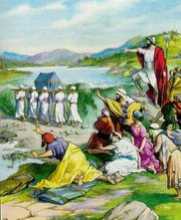Shabbat Shalom and welcome to Judeo Talk. The Torah portion for this week is Parsha Ri'eh, Deuteronomy 11:26-16:17.
If ever a scholar needed a quick and dirty reference text for kosher law, Ri'eh is it. As is the trend in Deuteronomy, much of this parsha is a recap of various related rules, morals and ordinances. It discusses what may and may not be eaten, how people may and may not worship and what separates a bondsman from a free man.
The main theme running through this parsha is the creation of divisions. According to the law there is ritual distinction between the Hebrew and the foreigner such that the foreigner is not obligated to follow the dietary laws of kashrut, but neither is the foreigner permitted to lend a Hebrew person money or other resources. It is clear in Ri'eh that the Israelites are to consider all non-Jews to be ignorant of the law and therefore not obligated to follow it, or for that matter not trustworthy according to the ethics set out by the Torah. This opens up the potential for a discussion on how the Torah views the nature of morality.
If one were to only reference parsha Ri'eh, one would come away thinking that the Torah deems all non-Jews inherently wicked. In short, this Torah portion is very unforgiving. The foreigner is ritually impure, is not to be trusted as a lender and has a spiritually poisonous presence that would turn devout Jews away from their God and their people. Thankfully, no portion of the Torah is meant to be read independent of the others. We know from previous parshiot that the Torah has the concept of the Righteous Gentile, the foreigner who has not been educated with the Law but still lives a good, ethical life.
So, what can we infer from these two concepts? In essence, that the philosophy of the Torah is one of will. Being a Hebrew does not make one automatically righteous nor does being a foreigner automatically make one evil. This parsha makes it clear that there must be a distinction between those who have been taught Judaic law and those who never had the opportunity. Basically, it's worse to break one of the rules knowingly than to sin in ignorance.
The other striking thing about this parsha is how brutal the law has become concerning the worship of other gods. In the plainest terms possible, anyone who even suggests following another deity is to be put to death on the spot. People are even encouraged to exact justice on their family members when they break this rule. As always, I think it's important to ask why this proclamation has been made at this particular time.
The Israelites are nearing the endgame for their story. Ri'eh points out all of the ways in which this infant nation could be compromised. It urges equal awareness of the threats from within as the ones from without. It's nationalism pure and simple, a fiery rush to the finish with as much of the culture intact as possible. It's ugly and it's frightening, but at the same time it looks a lot like revolution. The society is being closed off against any cultural intrusion and steeled against any internal weakness. For us modern readers, we need to understand that these ancient Hebrews were in a very different position than we are today. Unlike us, it didn't benefit them to be inclusive or multicultural. Being human, we might still have a lot in common with our ancestors, but we must also recognize how much our world has changed and continues to change.
